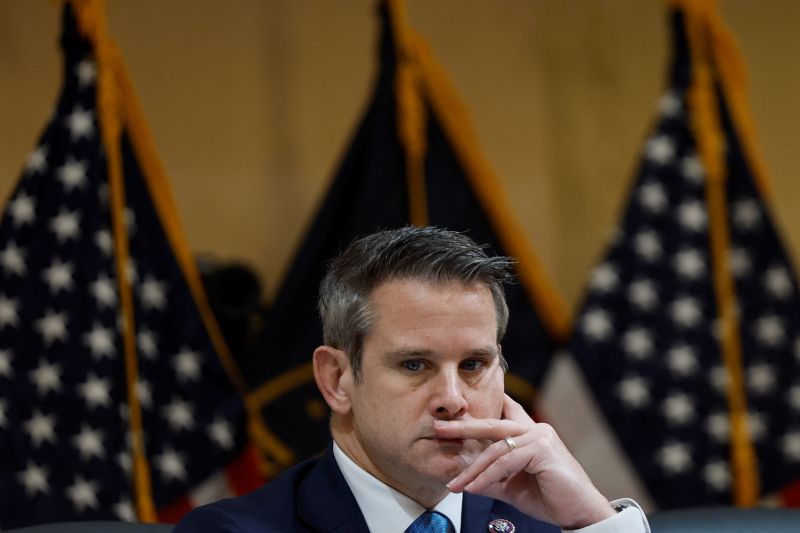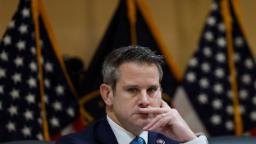Editor’s Note: David Axelrod, a senior CNN political commentator and host of “The Axe Files,” was a senior adviser to President Barack Obama and chief strategist for the 2008 and 2012 Obama presidential campaigns. The opinions expressed in this commentary are his. View more opinion on CNN.
CNN
—
Republican Rep. Adam Kinzinger of Illinois is a recovering politician.
Gerrymandered out of his district by Democrats, excommunicated from his party by Republicans, the Air Force veteran of the wars in Iraq and Afghanistan will be leaving Washington, DC, in January 2023 after a dozen years in Congress.
Still, it’s striking to hear anyone in public life candidly admit to a mistake – even “shame” – over a public act, as Kinzinger did during a conversation we had this week on my podcast, “The Axe Files.”
Kinzinger’s political journey from stalwart party man to lonely critic offers a parable about the powerful pull of tribe that has seized the Republicans, with grave implications for the GOP and our democracy.
The cause of Kinzinger’s contrition was not his vote in 2021 to impeach then-President Donald Trump for his role in the January 6 insurrection – a vote that made him and nine other apostate Republicans pariahs within the party’s congressional ranks.
Nor does he regret his decision to serve on the congressional committee formed by House Speaker Nancy Pelosi to probe the January 6 uprising and Trump’s relentless effort to overturn the 2020 election.
What causes Kinzinger particular anguish, he says, is that he didn’t vote to impeach the former President the first time he had the chance in 2019, when the House cited Trump for pressuring Ukrainian President Volodymyr Zelensky to dig up dirt on Trump’s rival, Joe Biden, and his son, Hunter Biden.
“You can always look back at 12 years and say there’s different regrets, different votes. That’s my biggest,” he says. “It is tough to take on your party. It is tough to know you’re going to get kicked out of the tribe. And it’s tough to make a decision that you know will cost you your reelection. And so I was looking for a reason out.”
The subject came up as Kinzinger catalogued the damning findings of the January 6 committee, including Trump’s pressure campaign to get the Department of Justice to allege evidence of massive voter fraud even though it had found none.
Trump, he says, “was deeply involved in this. He knew what he was doing … He knew when he told the DOJ officials to ‘Just say the election was corrupt. Look, I don’t … need your DOJ to go out and prosecute this for me. I just need you to put the stamp of corruption on it, and then me and the Republican congressmen will do the rest to undermine democracy.’”
I noted that this account was hauntingly reminiscent of Trump’s infamous conversation with Zelensky in the summer of 2019, when Trump tried to pressure Zelensky to launch a probe of Biden and his son over Hunter’s business dealings in Ukraine. At the time, Biden was emerging as a principal challenger to Trump in the 2020 election, but Zelensky did not grant Trump’s request.
Yet Kinzinger voted no to impeachment then – and acknowledges voting to reelect Trump in 2020.
“Looking back on it and seeing that pattern that exists…yeah if I could go back in time, I’d vote for it. And I probably would not have gotten reelected to this term.”
So why did he balk at holding Trump accountable then? And why have so few of Kinzinger’s Republican colleagues joined him in renouncing Trump now, even after all the chilling revelations about his leading role before, during and after the January 6 insurrection and the latest scandal over the highly classified documents the former President had stowed at Mar-a-Lago?
The answer is fear. But we often make the mistake of assuming that it is simply the fear of the loss of power. Kinzinger, who has spent a lot of time thinking about this since his rupture with the House Republican caucus over Trump, says it goes to more primal instincts over tribe and identity.
“Tribalism is deeply ingrained,” he explains. “I think this is part of what goes to explain why some of the leaders out here … are so silent. I think people in many cases fear, more than they fear death, they fear being kicked out of their tribe … When all of a sudden the people that you love lose respect for you or basically divorce you over text messages or whatever that is, that’s a terrible feeling. I’ve lived it.”
But when fearful leaders remain silent, or tacitly embrace conspiracy theories, it only reenforces them, creating an unwholesome feedback loop of misinformation. This is the reality of today’s Republican Party.
“You know, if you watch Fox News and Fox News says the election was stolen, and all the people you trust in Republican politics say the election was stolen,” those who defy the narrative are the outliers. It’s one reason why a majority of Republicans still say they view Biden’s election as illegitimate, he says.
Kinzinger will soon be out of office, but his “recovery” from politics may not hold.
The Country First PAC he formed last year has been active this primary season, targeting election-denying Republicans in contests across the country. He promises to continue the fight this fall, even supporting Democrats in select races against Republicans who have denied the 2020 election results.
Trump’s grip on the Republican Party is so great, Kinzinger says, that should the former President run, he will be the nominee in 2024 – “even if he’s indicted, for goodness sakes.”
Some have urged Kinzinger to run for president as an independent but he says – correctly, I believe –that such a candidacy in 2024 would likely drain more votes from the Democrats. “I think it reelects Donald Trump.”
But Kinzinger, who is just 44, hinted at his longer-term project: breaking the monopoly of the two major parties and creating a third that could meld center left and right voters.
“I do think we’re in a so divided moment that another party would be beneficial,” he says.
“If you look to ’28 or ‘32 and you begin to actually do the process of how do we lower the barriers to entry? … Those are the kinds of things that people interested in working outside a two-party system should be working on now.”
Correction: An earlier version misstated the year of former President Donald Trump’s first impeachment. It has been updated to reflect the correct date.








More News
Just How Dangerous Is Europe’s Rising Far Right?
Xi Visits Europe, Seeking Strategic Opportunity
D.C. court temporarily suspends Trump lawyer John Eastman’s law license